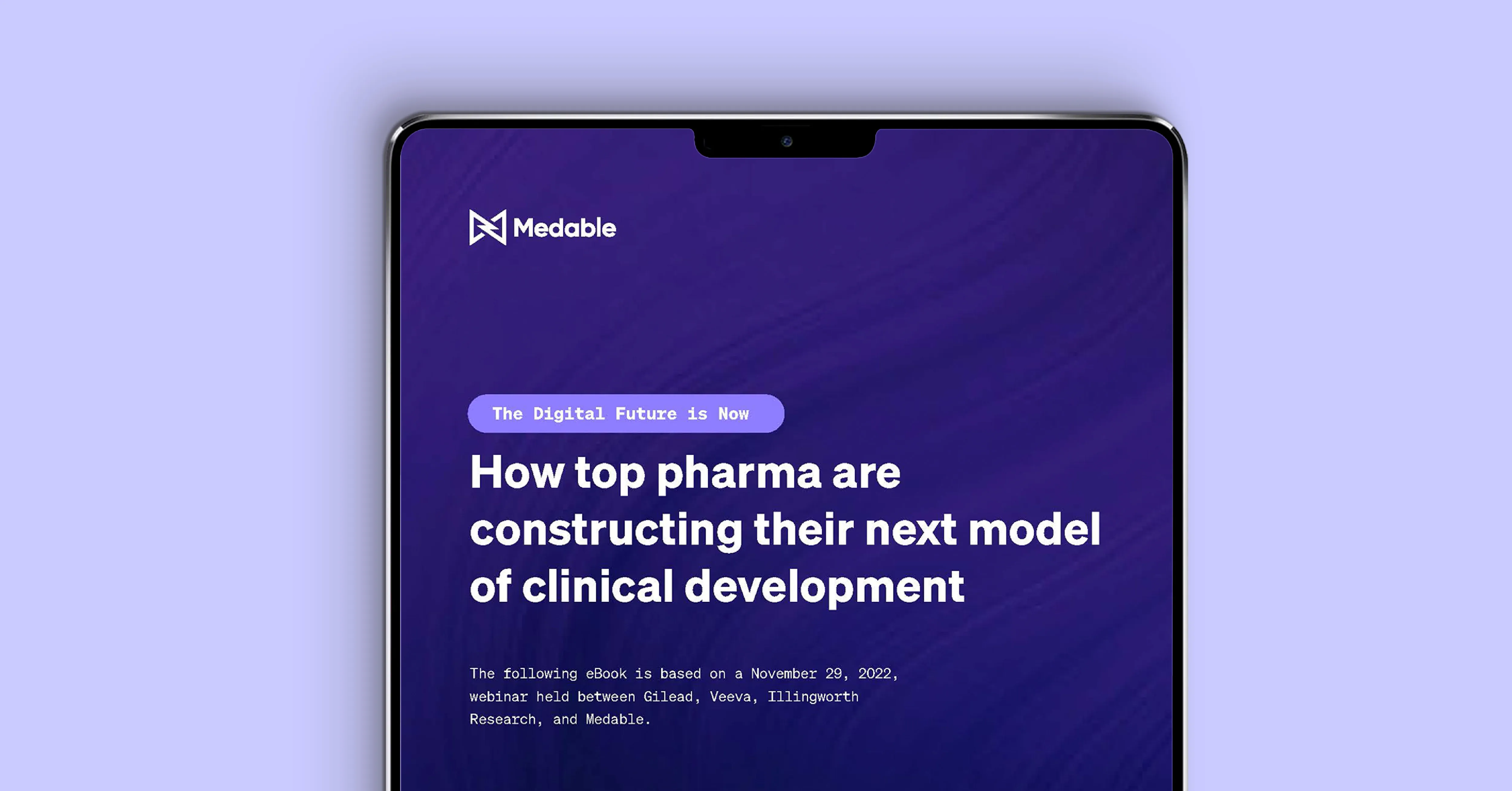Decentralized Clinical Trials


Innovation Evidence : A Tufts CSDD workshop
In the five years since the pandemic, decentralized trial elements have solidified their status in medical product development.
Trials with decentralized elements have moved past the “pilot” phase. The question is no longer whether we can operationalize decentralized trial components, it's whether we’re doing it thoughtfully at the pace patients deserve. Our industry is ready to optimize the elements for the trial based on available evidence.
That’s exactly why Medable, in collaboration with and facilitated by the Tufts Center for the Study of Drug Development (Tufts CSDD), has launched the Innovation Evidence Workshop series.
Last November, the inaugural, invitation-only workshop brought leaders from 20 pharmaceutical, biotech, and CRO organizations together in Boston, with representation from the U.S. Food and Drug Administration, Harvard MRCT Center, Tufts CSDD, and Medable.


Sponsors talk AI: Takeda’s take on the evolving role of AI in clinical trials
Artificial intelligence continues to influence nearly every industry, and life sciences are no exception. In a recent conversation on the AI and Business podcast, Damien Nero, Head of Data Science in US Medical at Takeda Pharmaceuticals, shared his perspective on how AI is changing the clinical trial landscape. With over 15 years of experience applying machine learning and real-world data to drug development, Nero outlined both the progress already being made and the challenges that still stand in the way of broader transformation. His insights highlight how pharmaceutical leaders can think strategically about deploying AI to balance innovation with operational efficiency.


Instant eCOA generation, refinement, and scaling with Medable AI
Watch the latest demo that shows you how to create eCOAs in seconds with Medable Studio and AI.


The critical role of eCOA software in shaping modern clinical trial design
Discover how eCOA software is reshaping modern clinical trials by enabling decentralized designs, enhancing patient adherence, and optimizing data collection through real-time digital tools. Learn how cloud-based solutions and AI are driving the next evolution in clinical research.


Back to basics: How the FDA's diversity requirements impact clinical trial treatments
The FDA is taking steps to ensure that clinical trials are more representative of the diverse populations they aim to serve. This comes after the industry and the FDA's long-term recognition that clinical trials have often excluded underrepresented groups, leading to health disparities across the United States and the world.


The Future of decentralized clinical trials: Opportunities and adaptations for Medable
Traditionally, clinical trials have relied heavily on centralized sites and face-to-face interactions between researchers and participants. However, the limitations of this model have become increasingly apparent, especially during the COVID-19 pandemic, which prompted an unprecedented emergence of decentralized clinical trials (DCTs), whose characteristics of remote patient engagement, virtual assessments, and mobile health technologies allowed the healthcare industry to continue drug development (albeit at a slower pace). As the healthcare landscape continues to evolve, DCTs are emerging as a vital component of the clinical research ecosystem. By leveraging technology and data to streamline processes and the need to enroll a greater diverse patient population, DCTs promise enhanced patient engagement, improved data quality, and accelerated study timelines. As with everything in life, nothing is always that simple. In this blog, we will explore the future of decentralized clinical trials and look at the challenges faced by sponsors, sites, and patients when planning, implementing, and running a DCT. We will also discuss how Medable is continuously adapting its platform and software capabilities to reduce risks and provide solutions that allow the benefits of DCTs listed above to be fully realized.


Bringing empathy into the digital environment
Learn best practices to incorporate empathy and human interaction in the digital environment with attentive listening, building relationships with sites, promoting clinical trial technology implementation, and learning from other industries that have successfully transitioned to digital.


Last Year’s DCT Is Today’s Clinical Trial
DCTs have transformed from a disruptive force challenging the norm to an integral concept, now widely embraced in the clinical trial landscape. Join us for this upcoming Clinical Leader Live session, where experts will explore the current landscape, highlighting the positive impact of DCTs and their transition from innovation to indispensable practice in the era of evidence generation and modern clinical trials.


Rapid evolution: How DCT’s DNA became standard in modern clinical trials
It’s impossible to deny how different clinical trials look almost four years after the pandemic revolutionized clinical research. Today, the digital and decentralized tools and technologies that enabled clinical trials to carry on through the COVID-19 pandemic are present (in some form) in nearly all clinical trials, a far cry from the dynamics of 2019.


The Digital Future is Now eBook
According to Grandview Research,the hybrid and decentralized clinicaltrial (DCT) market will be worth more than 12 billion dollars by 2030. Sparked by the COVID-19 pandemic of 2020, the rapid ascent of patient centered technology and the digital and decentralized trials they’ve spawned has forever changed the landscape of clinical conduct.


The Definitive Guide to Digital Evidence Generation
According to Grandview Research, the hybrid and decentralized clinical trial (DCT) market will be worth more than 12 billion dollars by 2030. Sparked by the COVID-19 pandemic of 2020, the rapid ascent of patient-centered technology and the digital and decentralized trials they’ve spawned has forever changed the landscape of clinical conduct. Sponsors are increasingly turning to DCT platforms in alignment with the rise of Life Science and Software-as-a-Service (SaaS) solutions. For those who haven't made the jump yet, there are many questions, including "What is a decentralized clinical trial?" Find out with this in-depth guide to decentralized clinical trials. Uncover how they work, their benefits, and how they transform clinical development.


Back to basics: What is electronic informed consent (eConsent)
While informed consent form (ICF) signatures traditionally have been collected on paper at a physical site, today’s digital approach — electronic consent (eConsent) — offers more than high-tech signature collection. It provides an upgrade to patient education and communication as well, empowering participants in new ways. Moreover, eConsent can democratize clinical trial access, allowing researchers to recruit broader and more diverse participant groups through entirely remote consenting processes. This broader and less burdensome access also can increase the speed of recruitment and reduce drop-out rates.




